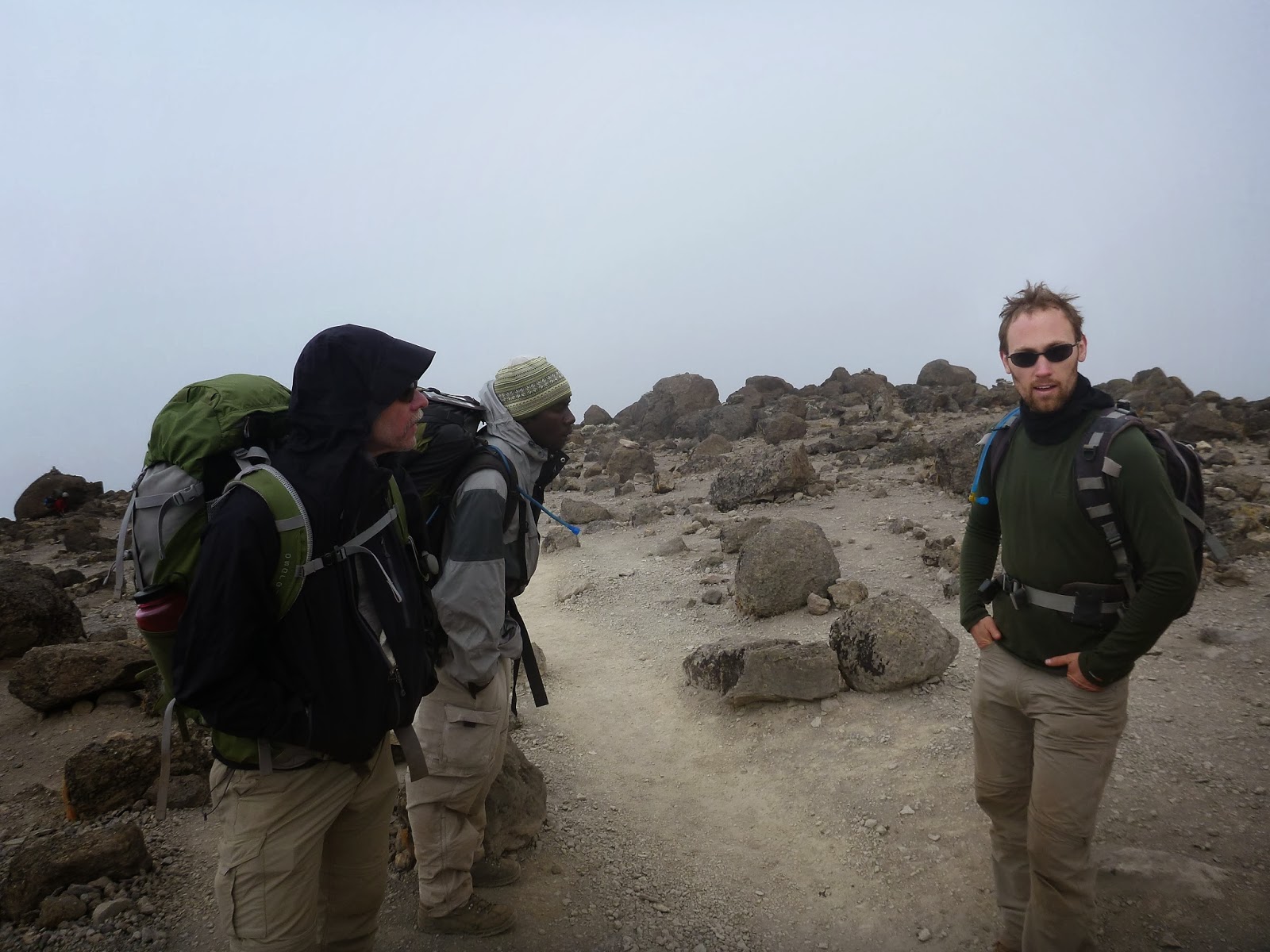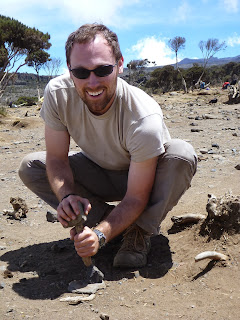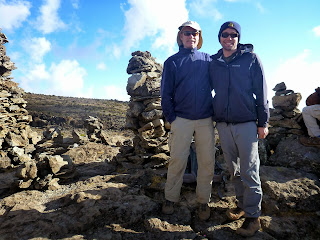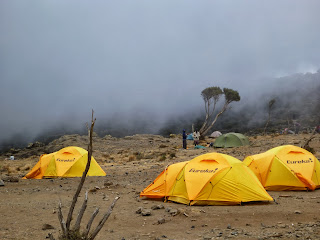The idea was to sleep from 7pm until 1am. Most groups would be leaving at midnight but Baraka felt that if we left at midnight, we'd arrive at the summit before sunrise. I didn't sleep much before the summit push. The headache I'd been fighting since noon wasn't going anywhere. I knew that the porters had carried all of our water to this camp and that knowledge made me reluctant to drink much. The problem was that the Diamox still made me pee all the time so without drinking at least a gallon each day, it was impossible to stave off dehydration. I'm sure the altitude was playing a role too. I did feel weaker than usual.
If you ever hike Kili, bring ear plugs. At 11p I heard the other groups get up, pack, and go to "breakfast." An hour later, we did the same. It was quite cold at night at 15,000'. I put on all the cold weather gear I had*, grabbed the lightest pack I'd ever carried and headed into the mess tent.
Up until this point, breakfasts on Kili had been awesome. We'd always had meat, fruit, and some carbs. Also their was typically a lot of it. As anyone who has been around me knows, I must must must eat a big breakfast. Before I ran the Bolder Boulder for the first time, I ate two strips of bacon and three scrambled eggs. The midnight breakfast that greeted us today though left a lot to be desired. In front of us was a bowl of millet porridge. That was it. I started freaking out and Baraka said, "In my experience, most people can't handle a big breakfast at this altitude." I have no choice, I thought. What I should have done is headed back to the tent and started devouring food. I had brought a lot of extra food on the hike but for some reason I didn't do that. I drank two cups of coffee, ate some of the porridge and then it was time to go.
 |
| Don't get hurt on Kili. |
The key to climbing mountains is to never ever think about getting to the top. I wouldn't recommend bringing this metaphor up in Tanzania but we're safe in blogland: Want to know how to eat an elephant? One bite at a time. That really is the secret to making it. The times below are rough estimates because I deliberately tried not to think about time at all.
We had only been hiking for about 30 minutes when we saw two headlights bobbing toward us. Someone's summit bid was over almost before it started. I didn't want to judge but I couldn't help but think about how much money and time it had taken to get that person to the high camp. I know that I would have had to have been dying to turn around that quickly into a summit push.
Shortly after that we started passing people who had left before us. I felt like we were walking slowly although I could not have gone any faster. However, speed is relative. My dad said we were a bunch of 80 year-olds passing a bunch of 90 year-olds. At one point he pulled out his phone and started playing AC/DC on speaker. In the ghostly quiet darkness and with the phone struggling through the cold, the music sounded distorted. I don't know what song it was and it turns out they are all pretty appropriately titled for a tough climb, but it helped a little.
 |
| Taken later, while Walker was in the crater |
The next few hours were unpleasant. I'd walk behind Baraka for as long as I could and then beg for a break. When granted, I'd immediately sit down and close my eyes until someone told me to get back up. Then I'd start walking again and we'd just repeat the cycle. Although I felt really sick, I knew I'd found a mental space where I believed I could go on forever. I wasn't able to enjoy the climb as much as I would have liked but I knew I could have gone much further if necessary. Honestly for me, the summit was never really in doubt.
The crux of the climb if one exists on Kili is Stella Point. It's more of a shelf that smells of piss but it's here that the grade lessens and if you've timed it right, the sun begins to rise. We took a much needed break here while Baraka passed around a clutch thermos of hot ginger tea. When you aren't hiking very quickly it's easy to get cold. Even with all of gear and heat packs in our gloves, Walker still lost some feeling in his toes for a few months.
The hike from Stella Point to the summit is a very gradual ridge walk. I took my time on this stretch. A beautiful sunrise now gave us a view of gnarled glaciers off to my left. Escorted by Walker and my dad, I did my best to savor the last few minutes of anticipation.
And then we were there! At 6:08, five hours after we'd started, we stood atop all of Africa! We only spent about 15 minutes at the top. It was cold and windy, and we still had to descend 9,000' to our camp spot for the night. Baraka and Walker headed off to the crater and the ash pit for some extra credit while the remaining four of us headed down to high camp. After a brief nap at the high camp, we leisurely made our way down to Mweka Camp for one last night on the mountain. On the way down, I drank tons of water and as we descended, my appetite returned. By the time we reached Mweka camp, I felt fine. Believe it or not, at Mweka camp you could buy beers for $5 a piece. I thought my dad would definitely have a celebratory brew but after a long night/day no one really felt like having a beer. The next morning, we descended back through the jungle to Mweka Gate and the end of our time on Kili.
Climbing Mt. Kilimanjaro I experienced a lot of things, many of them unexpected. I'll remember this trip forever. The beginning three days had been extremely easy. We'd eaten dust, played with obsidion, played countless hours of cards, and eaten our weight in fresh fruit. I'd dealt with the emotions of having really poor people carry my pack, cook my food, and even heat my wash water. Lastly, I'd endured a surprisingly difficult summit push. But all of that fades into the background for me. What I'll remember and treasure forever was getting to spend every hour of every day on the mountain with Walker and my Dad. I am truly grateful.
Day 5: Barafu Camp (15,331') to Uhuru Peak (19,341') to Mweka Camp (10,065'). 10 miles
Day 6: Mweka Camp (10,065') to Mweka Gate (5,380'). 6 miles
*From bottom to top: sock liners, heavy wool socks, my trusty 15 year old Vasque full leather hiking boots, Patagonia capilene 3 long underwear bottoms, fleece lined snowpants, Outdoor Research gators, Patagonia capilene 3 long underwear top, wool sweater, North Face Nuptse Down Jacket, Columbia lined outer shell with hood, Hestra Gore Tex Gloves, wool hat, and a pair of safety glasses that Walker lent me that would stop grenade fragments and, you know, wind.












































